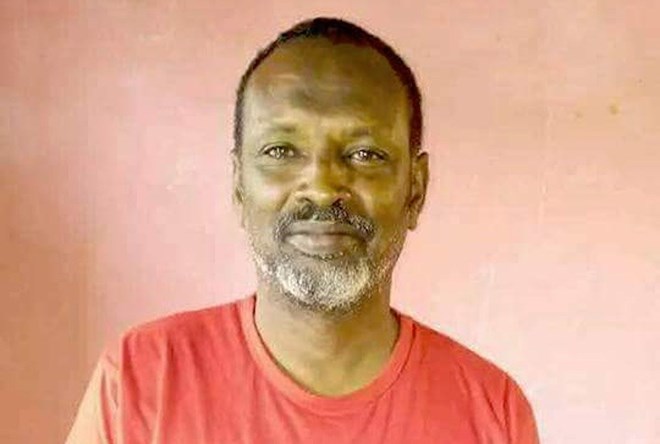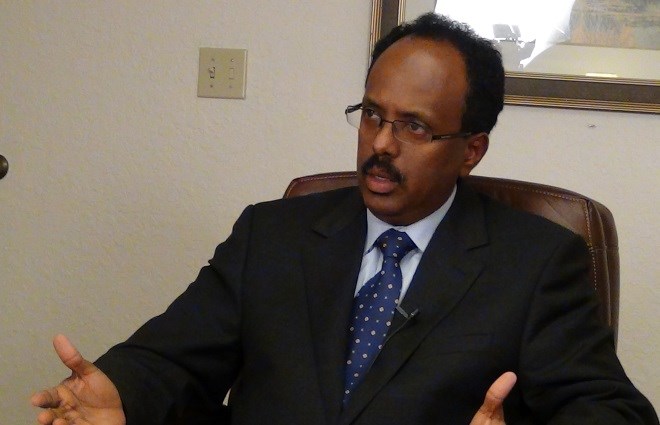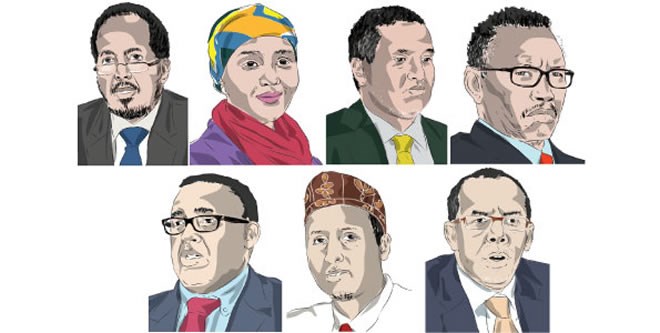The Ignoble Betrayal of Colonel Abdikarim Muse (Qalbi-dhagax)
Tuesday, September 5, 2017
By Heikal Kenneded

Somalis around the world are quite stunned about the controversy of illegal extradition of a Somali national to the repressive Ethiopian authorities. The revelations came as Colonel Abdikarim Sheikh Muse, known as Qalbi-dhagax who was recently captured while on a short visit in the Galmudug region – in the town of Adado for family matters. He was initially suspected of being part of the Al-Shabab terrorist group and haphazardly thrown in jail, according to reliable sources. However, when his name was checked against the database of Ethiopian list of terrorists, he was suspected as a designated terrorist leader of the Ogaden National Liberation Front (ONLF). Interestingly, the situation get out of hand when high ranking security officials in Mogadishu became aware last week about the secret venal negotiations between the Galmudug regional officials with the Ethiopian government in the handover of Colonel Qalbi-dhagax, which allegedly involved money bribery. The same sources allege the highest Somali national security forces visited the town of Adado to take over the situation and immediately put Qalbi-dhagax in a military aircraft and delivered him in Mogadishu on Sunday and then transferred him to an Ethiopian base in Baidoa on the following Monday, and eventually to Ethiopia. Colonel Qalbi-dhagax ‘s extradition is an opening gambit for Somalia’s diplomatic relationship with Ethiopia.
So far, the Somali government declined to comment on the important questions of why, how and whose decision was the illegal extradition of Colonel Qalbi-dhagax to the Ethiopian government. But ironically the only concrete comment regarding this issue was made by the Ethiopian Communication Minister who declared that the Somali authorities handed them over Colonel Qalbi-dhagax. it’s alleged that Ethiopia demanded that Colonel Qalbi-dhagax should be extradited to Ethiopia for his involvement in plotting terror attacks in various parts of Ethiopia and allegedly being the mastermind behind the Apr 24, 2007 – when ONLF gunmen launched an attack on the oil field in the Ogaden regional state, where a Chinese company was exploring for oil and thus allegedly killed 65 Ethiopian employees. Still, the Somali government should have required like any sovereign entity to see any substantial evidence to hand him over to Ethiopia, instead of now enduring so much controversy in the public arena.
If President Farmajo doesn’t change course and directly speak to the public about this horrendous blunder of his government and immediately sack all high ranking official and security elements involved in this case, he would allow to lose the unprecedented public support that he achieved in his presidential election. The public would prefer to the let the president absolve himself and explain what exactly happened, instead of allowing the social media to fester with unfounded innuendos. President Farmajo is rallied behind because he was his own man and would never succumb to the pressures of the hegemony of the Ethiopian authoritarian regime
But for now, President Farmajo seems grimly to practice what other Somali regional leaders have been practicing in the past to appease the draconian Ethiopian regime in order to secure their power. He is merely acting on the proposition to extradite whoever the Ethiopian government accuses of terrorism, despite any due process. In taking this step, President Farmajo is not only betraying the Somali constitution that he swore to uphold, but also the unwavering support of the Somali public both in the country and in the diaspora who wholeheartedly rallied behind his recent election. Now, it’s quite distressing to see that President Farmajo’s men are allegedly in dock over the illegal extradition of a Somali national to Ethiopia.
Speaking to reporters on his quarterly media chat, last week Prime Minister Hassan Kheyre was asked the serious allegations of handing over Colonel Qalbi-dhagax to Ethiopia, but the microphone was unceremoniously highjacked by the head of the country’s national security officer, Abdullahi Mohamed Ali Sanbololshe’s who claimed that this was a “serious” issue and the government will comment at an appropriate time. Then the Prime Minister declined to further comment on the issue, in complete agreement of Sanbololshe. Nevertheless, this political gaffe has also exposed sharp differences between President Farmajo and his subordinates, which represents an opening for the enemy. Though President Farmajo’s defenders may point to either being set up by the corrupted Ethiopian government or being undermined by his incorrigible subordinates.
It’s alleged the security forces of the Somali Government orchestrated this egregious handover of Colonel Qalbi-dhagax to the repressive Ethiopian government in order to appease its meddling of the Somali regional politics, according to Somali intelligence officials. Nevertheless, President Farmajo cannot absolve himself of any wrong doing because no matter who was responsible of this egregious act of illegal extradition of a Somali national to the enemy of the state, the buck stops with him. Since there is so much hysteria and misinformation, the President needs to clear the air and start separating fact from fiction, because no one else will do that for him.
Historically, Ethiopia has repeatedly charged that its troops are in Somalia mainly because of security reasons to protect its borders and further alleged the successive Somali governments are not equipped of containing such security threats. Intelligence officials said their working theory since this incident is that either President Farmajo or Prime Minister Hassan Kheyre during their most recent visit to Ethiopia made a pact with the government of Ethiopia to extradite any alleged terrorists to Ethiopia. In this pretext, Ethiopia justifies its naked invasion on Somalia territory.
In justifying the alleged kidnapping of Colonel Qalbi-dhagax, Ethiopia alleges that he is a high-ranking member of the ONLF rebel group that wages war against their repressive government. Even this is a big stretch, and it is not enough for the Somali government to commit such criminal act of extrajudicial extradition. Because most people who closely know the history of Colonel Qalbi-dhagax assert that he has devoted most of his military career in defending the Somali unity and joined the Somali army at the age of 17 years old. Further, he was a resident of the capital for the past three years, where he peacefully lived and committed no crimes, known to anyone. In the end, this illegal extradition incident will most likely open a bitter feud among the country’s different branches of government that might simmer for months, which in the end has the potential of destabilizing the country.
Again, the question that is on everyone’s lips is who from the Somali Government meted out this gross injustice to Colonel Qalbi-dhagax? Is there a cabal of crooks working in Somalia for extradition related cases?
Heikal Kenneded
heikalk@yahoo.com
Washington D.C.
So far, the Somali government declined to comment on the important questions of why, how and whose decision was the illegal extradition of Colonel Qalbi-dhagax to the Ethiopian government. But ironically the only concrete comment regarding this issue was made by the Ethiopian Communication Minister who declared that the Somali authorities handed them over Colonel Qalbi-dhagax. it’s alleged that Ethiopia demanded that Colonel Qalbi-dhagax should be extradited to Ethiopia for his involvement in plotting terror attacks in various parts of Ethiopia and allegedly being the mastermind behind the Apr 24, 2007 – when ONLF gunmen launched an attack on the oil field in the Ogaden regional state, where a Chinese company was exploring for oil and thus allegedly killed 65 Ethiopian employees. Still, the Somali government should have required like any sovereign entity to see any substantial evidence to hand him over to Ethiopia, instead of now enduring so much controversy in the public arena.
If President Farmajo doesn’t change course and directly speak to the public about this horrendous blunder of his government and immediately sack all high ranking official and security elements involved in this case, he would allow to lose the unprecedented public support that he achieved in his presidential election. The public would prefer to the let the president absolve himself and explain what exactly happened, instead of allowing the social media to fester with unfounded innuendos. President Farmajo is rallied behind because he was his own man and would never succumb to the pressures of the hegemony of the Ethiopian authoritarian regime
But for now, President Farmajo seems grimly to practice what other Somali regional leaders have been practicing in the past to appease the draconian Ethiopian regime in order to secure their power. He is merely acting on the proposition to extradite whoever the Ethiopian government accuses of terrorism, despite any due process. In taking this step, President Farmajo is not only betraying the Somali constitution that he swore to uphold, but also the unwavering support of the Somali public both in the country and in the diaspora who wholeheartedly rallied behind his recent election. Now, it’s quite distressing to see that President Farmajo’s men are allegedly in dock over the illegal extradition of a Somali national to Ethiopia.
Speaking to reporters on his quarterly media chat, last week Prime Minister Hassan Kheyre was asked the serious allegations of handing over Colonel Qalbi-dhagax to Ethiopia, but the microphone was unceremoniously highjacked by the head of the country’s national security officer, Abdullahi Mohamed Ali Sanbololshe’s who claimed that this was a “serious” issue and the government will comment at an appropriate time. Then the Prime Minister declined to further comment on the issue, in complete agreement of Sanbololshe. Nevertheless, this political gaffe has also exposed sharp differences between President Farmajo and his subordinates, which represents an opening for the enemy. Though President Farmajo’s defenders may point to either being set up by the corrupted Ethiopian government or being undermined by his incorrigible subordinates.
It’s alleged the security forces of the Somali Government orchestrated this egregious handover of Colonel Qalbi-dhagax to the repressive Ethiopian government in order to appease its meddling of the Somali regional politics, according to Somali intelligence officials. Nevertheless, President Farmajo cannot absolve himself of any wrong doing because no matter who was responsible of this egregious act of illegal extradition of a Somali national to the enemy of the state, the buck stops with him. Since there is so much hysteria and misinformation, the President needs to clear the air and start separating fact from fiction, because no one else will do that for him.
Historically, Ethiopia has repeatedly charged that its troops are in Somalia mainly because of security reasons to protect its borders and further alleged the successive Somali governments are not equipped of containing such security threats. Intelligence officials said their working theory since this incident is that either President Farmajo or Prime Minister Hassan Kheyre during their most recent visit to Ethiopia made a pact with the government of Ethiopia to extradite any alleged terrorists to Ethiopia. In this pretext, Ethiopia justifies its naked invasion on Somalia territory.
In justifying the alleged kidnapping of Colonel Qalbi-dhagax, Ethiopia alleges that he is a high-ranking member of the ONLF rebel group that wages war against their repressive government. Even this is a big stretch, and it is not enough for the Somali government to commit such criminal act of extrajudicial extradition. Because most people who closely know the history of Colonel Qalbi-dhagax assert that he has devoted most of his military career in defending the Somali unity and joined the Somali army at the age of 17 years old. Further, he was a resident of the capital for the past three years, where he peacefully lived and committed no crimes, known to anyone. In the end, this illegal extradition incident will most likely open a bitter feud among the country’s different branches of government that might simmer for months, which in the end has the potential of destabilizing the country.
Again, the question that is on everyone’s lips is who from the Somali Government meted out this gross injustice to Colonel Qalbi-dhagax? Is there a cabal of crooks working in Somalia for extradition related cases?
Heikal Kenneded
heikalk@yahoo.com
Washington D.C.



